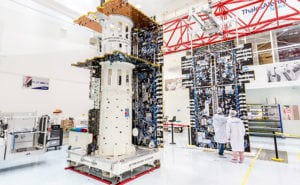Thales Alenia Space Finishes Europasat Construction for Inmarsat IFC Network

Thales Alenia Space assembles the communication module of Inmarsat’s European Aviation Network satellite
Photo: Thales Alenia Space/Imag[IN]
Europasat is half of a joint satellite between Inmarsat and Hellas Sat, with Hellas-Sat’s payload, Hellas Sat 3, carrying 44 Ku-band transponders plus one for Ka-band. Along with the space segment, EAN also leverages an Air-to-Ground (ATG) network across the European Union (EU). Inmarsat partner Deutsche Telekom will operate the ATG LTE network of approximately 300 towers. The satellite has been custom-designed to provide Mobile Satellite Services (MSS) to aircraft flying over dense European routes, exploiting Inmarsat’s 30MHz (2 x 15MHz) S-band spectrum allocation in all 28 EU member states, plus Norway and Switzerland. Aircraft will switch automatically between satellite and terrestrial connectivity using an on–board network communicator.
“The European Aviation Network … will offer unprecedented high-speed capacity at 75Mbps with near zero latency while flying over Europe, so passengers can enjoy an easy-to-use true broadband experience for internet streaming, gaming and other online services direct to their personal smart devices,” said Leo Mondale, president of Inmarsat Aviation.
Over the coming months, the satellite will undergo thermal vacuum, mechanical and acoustic testing to ensure it operates nominally. Once these tests are complete, SpaceX will prepare the satellite for launch at Cape Canaveral in Florida. The launch, originally envisioned for 2016, is now scheduled to take place in 2017.